Panglao Island
- Bernd
- Jun 1, 2025
- 7 min read
Updated: Jun 2, 2025
2025

About an hour and a half south lies the small island of Panglao, in the southwest of Bohol Province. It is located in the immediate vicinity of the provincial capital, Tagbilaran, and is connected to it by two bridges.
The photo is deceptive. I'm simply waiting for a favorable moment. I'm manipulating—not a lie, mind you. But manipulation. As if I were traveling on behalf of an international tourism company. Striking landscape images trigger various suggestions of untouched nature for the work-life balance community. That's how they work, our media, our opinion makers.

Today I'm reporting from the small, tranquil island of Panglao. This is what it must have looked like once. Not a bad choice. Depending on the weather, turquoise, dreamy beaches, tropical vegetation, and cheerful people everywhere. A popular location with divers, too.
Disturbing realization
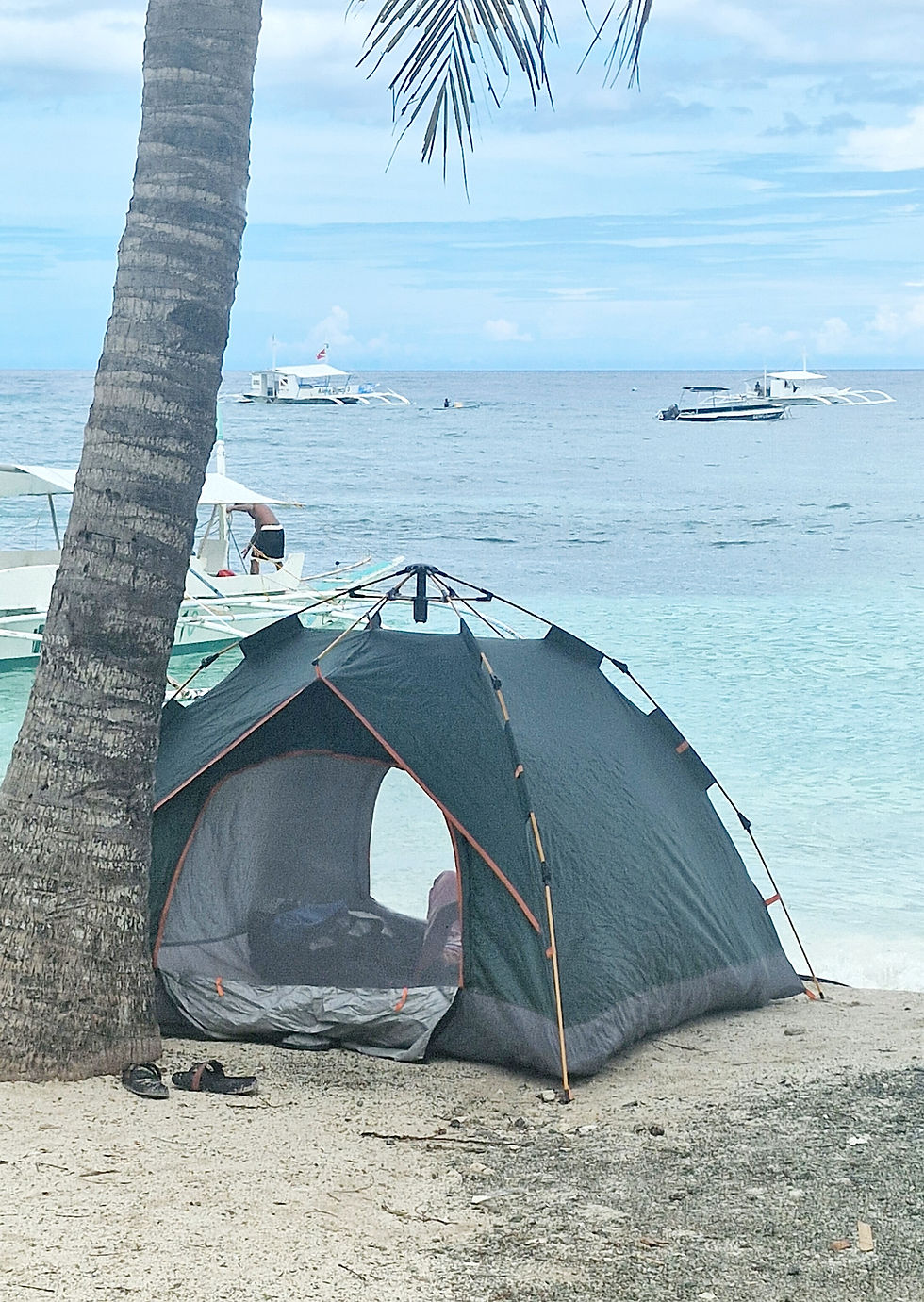
As a harried city dweller, you can never tire of the blue and turquoise hues of the sea and sky. They blend together on the horizon, like a Gauguin painting.
At first, a few backpackers wandered here, then more and more, until international package tourists also bite in. It's good for the local population, who also want a piece of the pie so that their own families don't just struggle for existence but generate prosperity.
This is how small, sleepy fishing villages become tourist hotspots. Dreamy beach restaurants are springing up, along with small guesthouses that accommodate backpackers and divers. Bars are also a must. The first diving schools and hotels are opening, as are massage parlors and spas, naturally.

Imagine waking up in the morning and being dead. That would ruin your whole day! So live!
Depending on the section of the beach, it's sometimes clean, sometimes less so. Here we go. Alona Beach is bordered by rock formations on both sides. In between lies the light, fine sand beach. So I walk from one end to the other.
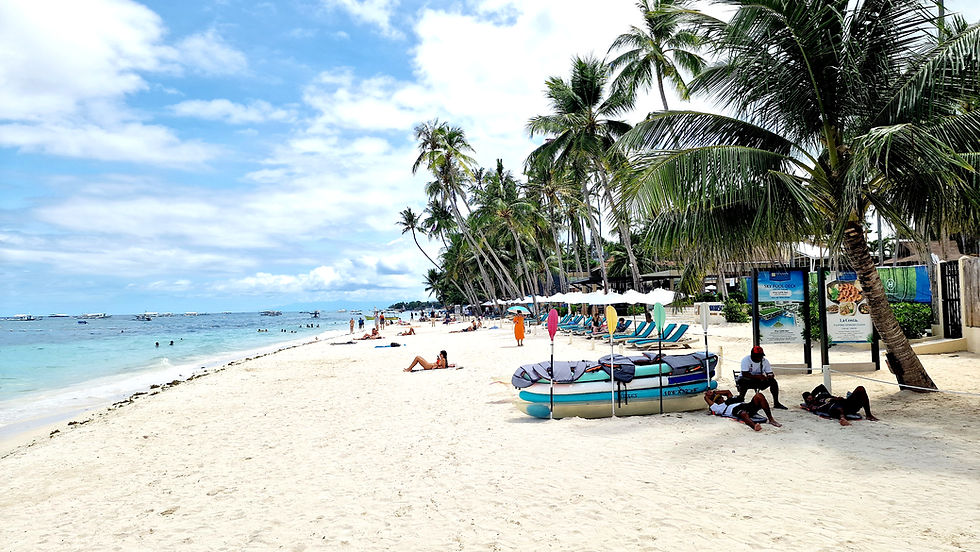
Of the masseuses, only the older ones approach me these days, which is probably due to my age. And the beach boys recruiting clients for their diving school on the promenade also ignore me.
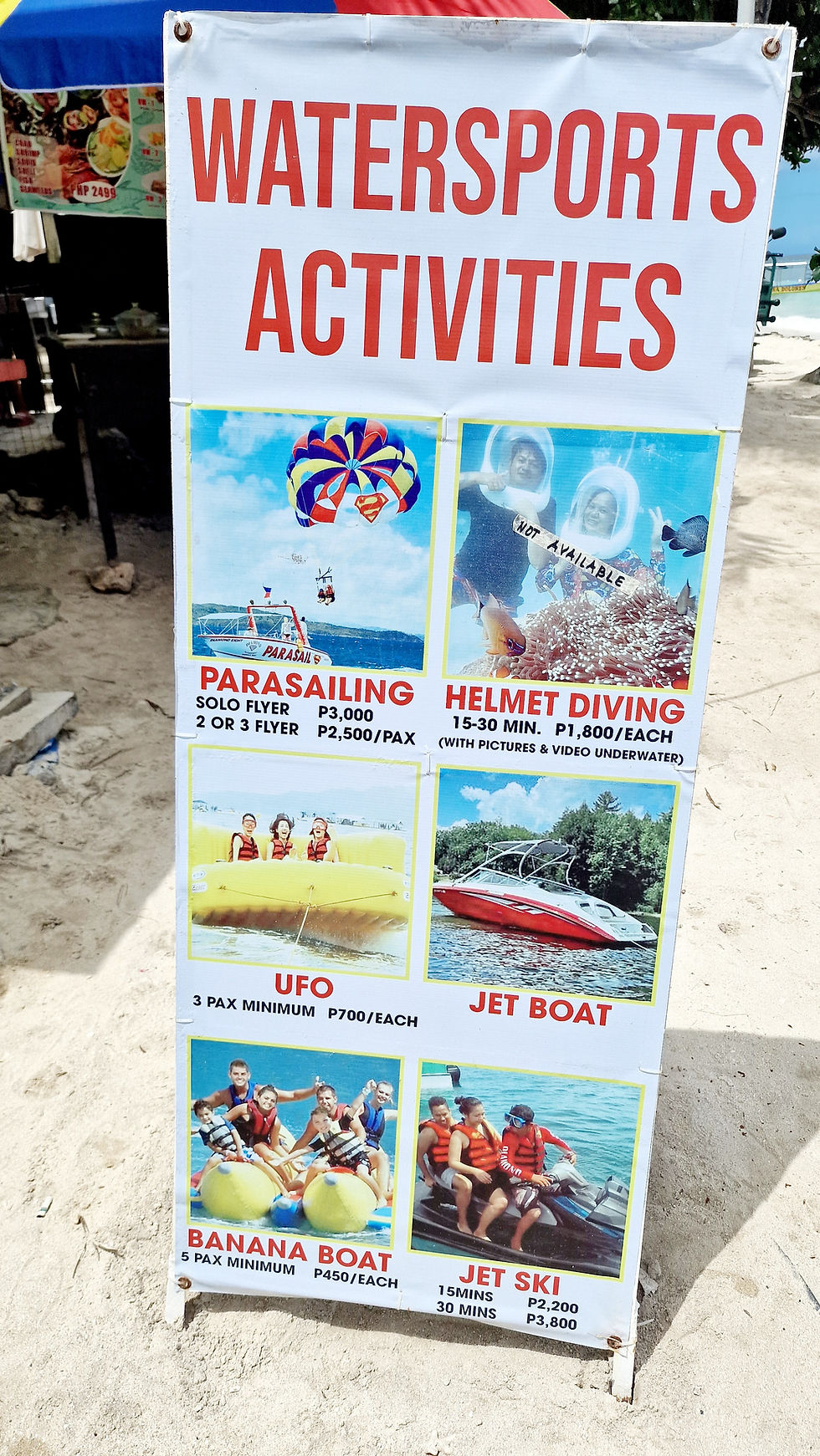
The motto is: By the time we get to the bottom, he'll already be dead.
I sit down on a small wall, listening to the surf and the music from a small beach bar. A hawker calls out, "Nice!" He holds what he claims is a real piece of coral in front of my nose. I shake my head in thanks.
It is pleasantly noticeable that people here are less aggressive in looking for customers and move on at the first "no".
Suddenly, clouds roll in. They cast a different light on the beach for me. It's dull, losing its radiance.
Scattered dirt catches my attention. An armada of tourist boats disturbs me. This could be somewhere in Thailand or Mexico.
And then a beach dog poops at my feet
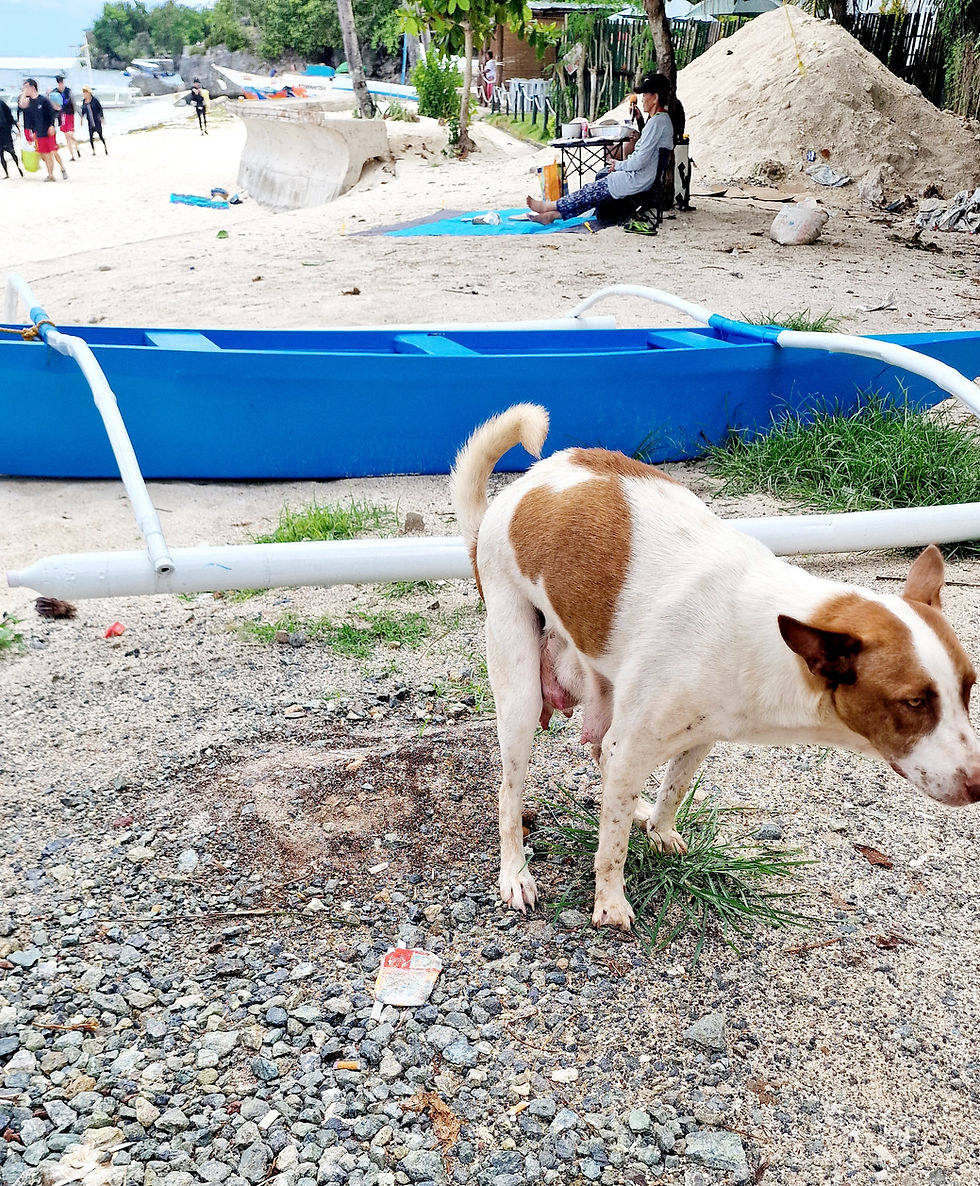
This makes me think. What is this creature trying to express to me? Is it a statement, a provocation? Should I take it personally? Why can't this dog do her business discreetly on the side of the road? No, it has to be right on the path to the beach, which people use every day.

I resolve to take a closer look during my walk along the beach. I notice that there are a large number of dogs—and certainly cats—roaming around, begging tourists in the numerous restaurants. They all have to do their business at some point.
It is almost mathematically certain that someone will come in and wonder why the restaurant smells so bad.
After all, the tourists who arrive are getting older and older and are only realising half as much.
And the younger ones are busy partying in the evening, getting drunk. They realize even less. Besides, it's dark...
Paradise in Need
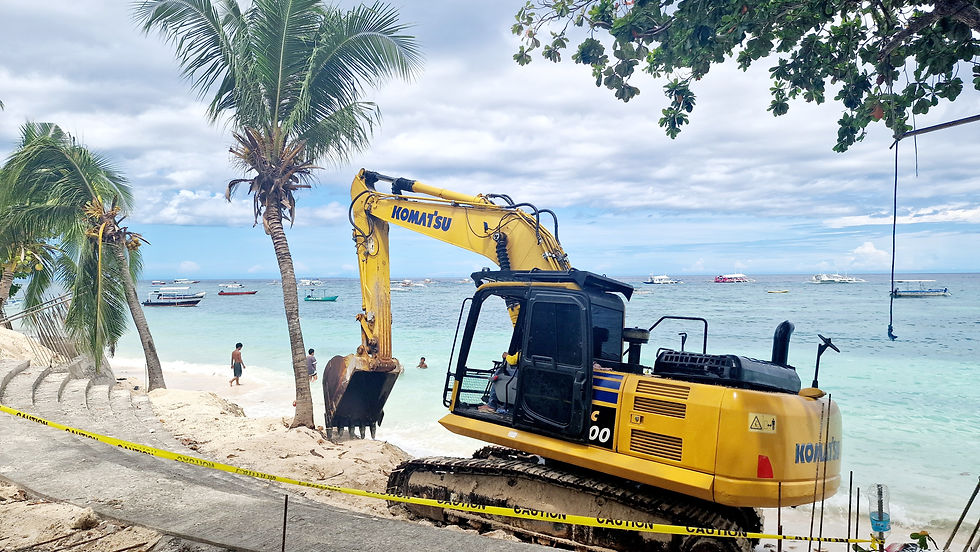
The capacity of shops and tourists here on Alona Beach is now reaching its limits. It's one of the most beautiful beaches and offers an alternative to the highly touristy and expensive Boracay.
Consequently, construction is taking place everywhere here. The number of international tourists is increasing, pushing the island's infrastructure to its limits.
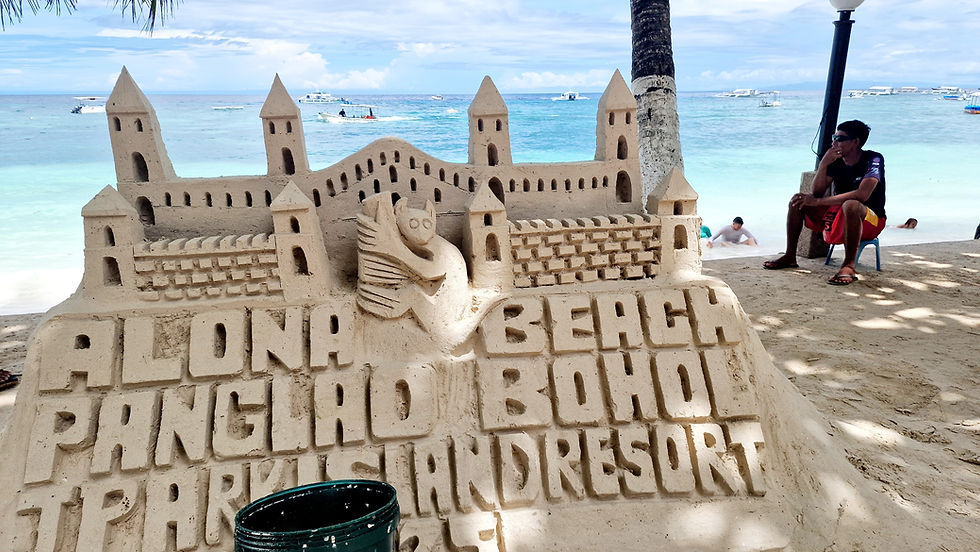
Households don't (yet) have septic tanks, which pollutes the groundwater and the sea.
There seems to be some sort of waste management system now. Environmental awareness is only slowly emerging. Locals and tourists alike still pollute the beaches.
The island's mangrove forests are endangered. Refuges for flora and fauna are increasingly being destroyed by tourism.
Coral reefs are important ecosystems and are severely threatened by the growing popularity of diving. Coral jewelry is still a popular souvenir.
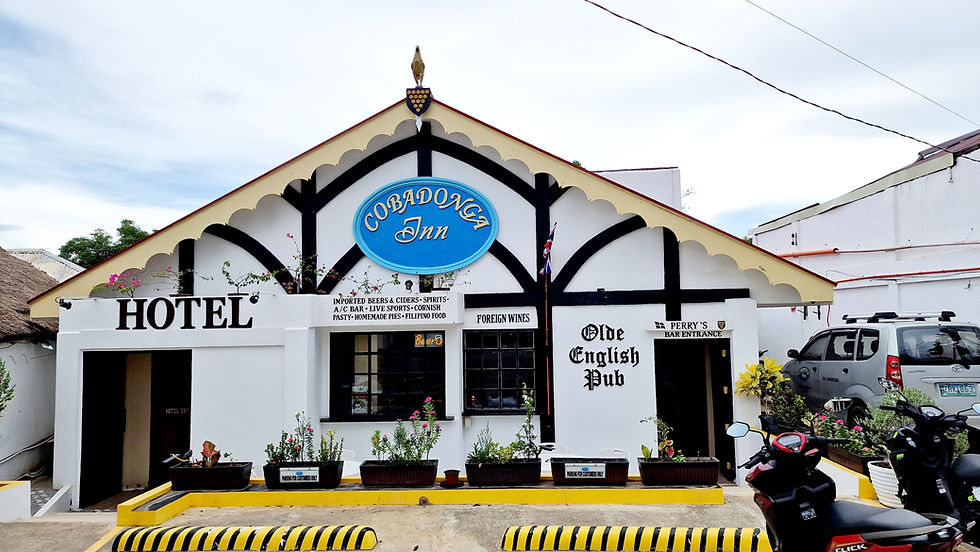
Meanwhile, the provincial government is working on protection plans for the island. We'll see how that pans out.
Perspectives
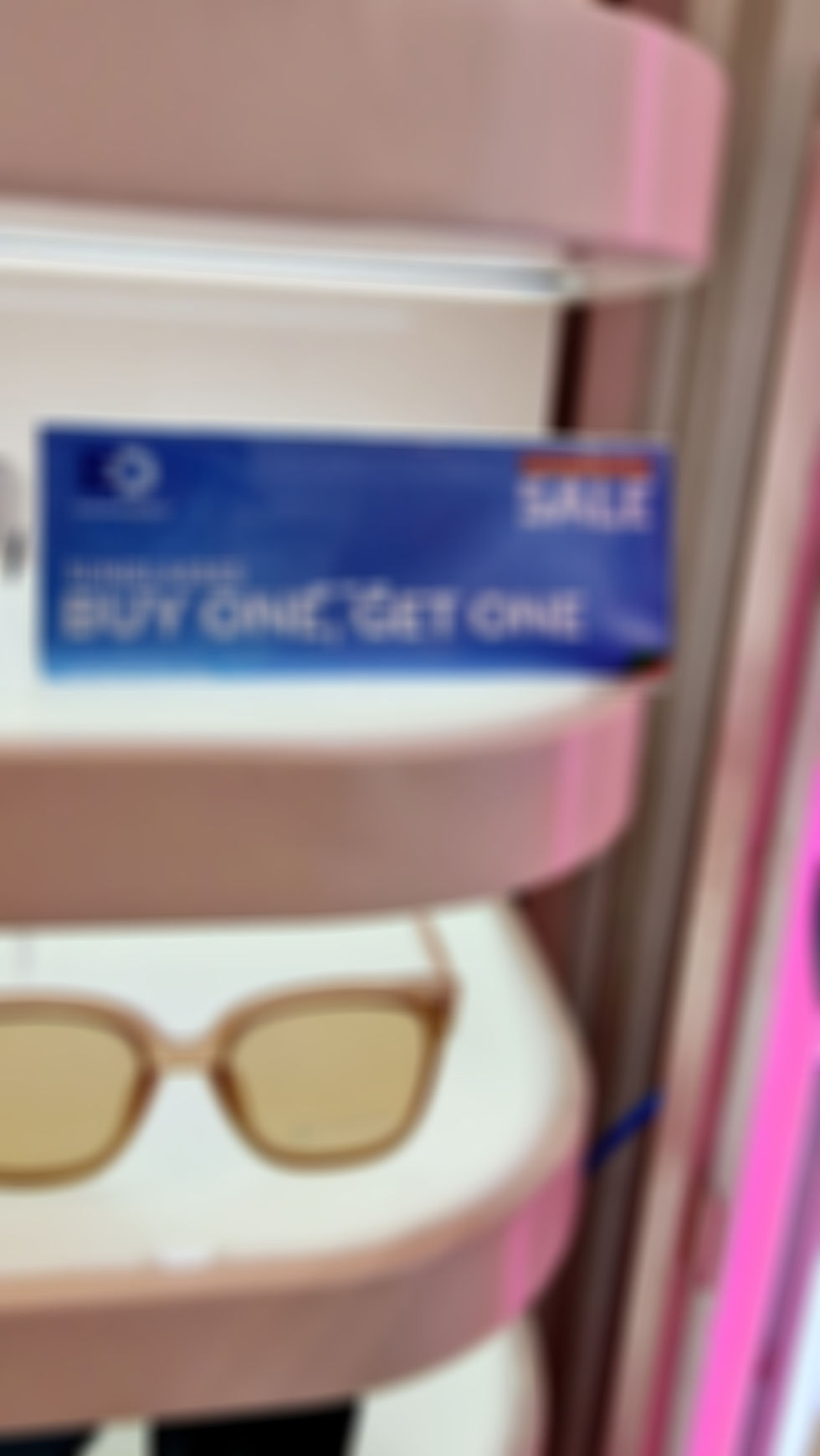
I absolutely have to get my sunglasses checked, otherwise the arms will break. There's no optician anywhere nearby. I guess I have no choice but to take a tuk-tuk to Tagbilaran. The driver takes me to Altura Mall.
A gaunt woman of about 60, with a striking face and alert eyes, catches my eye in the busy shop. As I later find out, she works as a nanny in the city. Her employer's child broke her glasses, and he has no intention of compensating her for the damage.
"You need progressive lenses," the saleswoman explains to the woman. "They cost twice as much." She stands helplessly in the salesroom with her hard-earned money. She's been saving for months. In vain.
She was just about to leave when I approached her boldly and—how do we say it these days?—proposed a deal.
I am a traveler, searching for stories that tell of people's lives. I'm interested in her story. May the constantly nagging Paritätische Welfare Association in Germany be with me.
In return, I pay for the glasses. I don't want to make her feel like a beggar. Her intelligent eyes study me intently. She smiles and agrees. I'm the only one in a long time who's shown interest in her story. Overjoyed, she leaves the store with me shortly afterward. She can pick up the glasses in a week.

We go to a fast-food restaurant. She introduces herself to me as Ledesma. She is happily married and has four children. Her husband is a farmer, but the farm is only enough to provide for their own needs. Unfortunately, she herself has no training.
Sometimes they sell some vegetables or fruit, but the income isn't enough to live on. So she works as a nanny seven days a week. She has two days off a month to be with her family. She uses every peso she can spare to finance her children's education.
The new glasses will change her life. I nod in agreement. What if she had mistaken the stingy boss's child due to impaired eyesight out in the park?
Wealth is not always a question of money.
"Bye-bye!" I called to him and watched him sink

Scent of Green Papaya Resort ***
My rating: ****
A very well-maintained 3-star resort with a small restaurant, two pools, and a tropical garden. The hotel is located in a quiet location, about a 1.2 km walk from the beach. Free shuttles to Alona Beach run several times a day.
I feel like Tom Hanks in "A Man Called Otto" all over again, just as grumpy, but without the suicidal tendencies. A family with 3 children live in the next room: Micky, 19, Marta, 17, and Don, 13. They love to watch loud TV. Preferably at the same time as TikTok, which, in my opinion, should be banned because people are becoming stupid even faster than other social media platforms.

At least they are understanding when I politely ask, in friendly Asian fashion, whether they could turn the volume down.
I'm sitting by the large pool, my legs dangling in the water. A Korean family with three small children is swimming in high-safety gear: swimsuits, life jackets, goggles, and a floating ring that runs in an S-shape from the head, over the neck, to the stomach, and back to the back. Bizarre.
The immobile children are protected by a male and a female nanny. The mother, in the form of a sumo wrestler, films the exuberant activities from her lounger.

Marta arrives with her younger brother, Don. Neither of them can swim, so they stay in the safe shallow water. Marta makes eye contact with me, points to the Koreans, and says reverently, "Very beautiful, very rich." I nod. I ask Don if he can swim. He nods cheekily and activates his rudimentary skills: Like a dog, he kicks in the chest-deep water and slowly sinks.
I indicate to him that he should swim above the water's surface, not below it. He grins, kicks, and swallows water. Meanwhile, the Korean high-security children are moving around in their restricted circles. Their skin is hermetically sealed from the water.
Chicken Killer and Basketball Player
Don kicks tirelessly. His siblings ask me if I could teach him to swim. I hesitate. I find pools annoying. Disgusting. But Don's kicking is unbearable. Children should be able to swim.
I teach him the basics: pushing the water away with his arms, kicking his legs like a frog, breathing through his nose, using the air in his lungs for buoyancy, keeping his head above water. That's it.
Don learns extremely quickly. At first, he does short distances, then he masters the entire lane, including the deep end of the pool. I don't let him out of my sight for a moment, in case he overestimates himself. Eventually, he expands his skills on his own, swimming underwater.
In the deep water he has fun, looks at me at the edge of the pool where I am sitting relaxed and simulates his downfall. I call out to him, "Bye-bye!" He goes under, sits briefly on the bottom of the pool, and resurfaces laughing.

I invite the family to dinner at the resort's small restaurant.
We order, among other things, chicken adobo. Micky grins broadly and says to me:
"At home, Don slaughters the chickens. That's why we call him Chickenkiller. Chicken is his favorite food. And he's a passionate basketball player.
Well then, tell that to the mothers at home in Berlin Prenzlauer Berg, I think to myself.
For a brief moment, I imagine that he no longer envies the other children for their swimming equipment.
Well done, Otto.




Comments